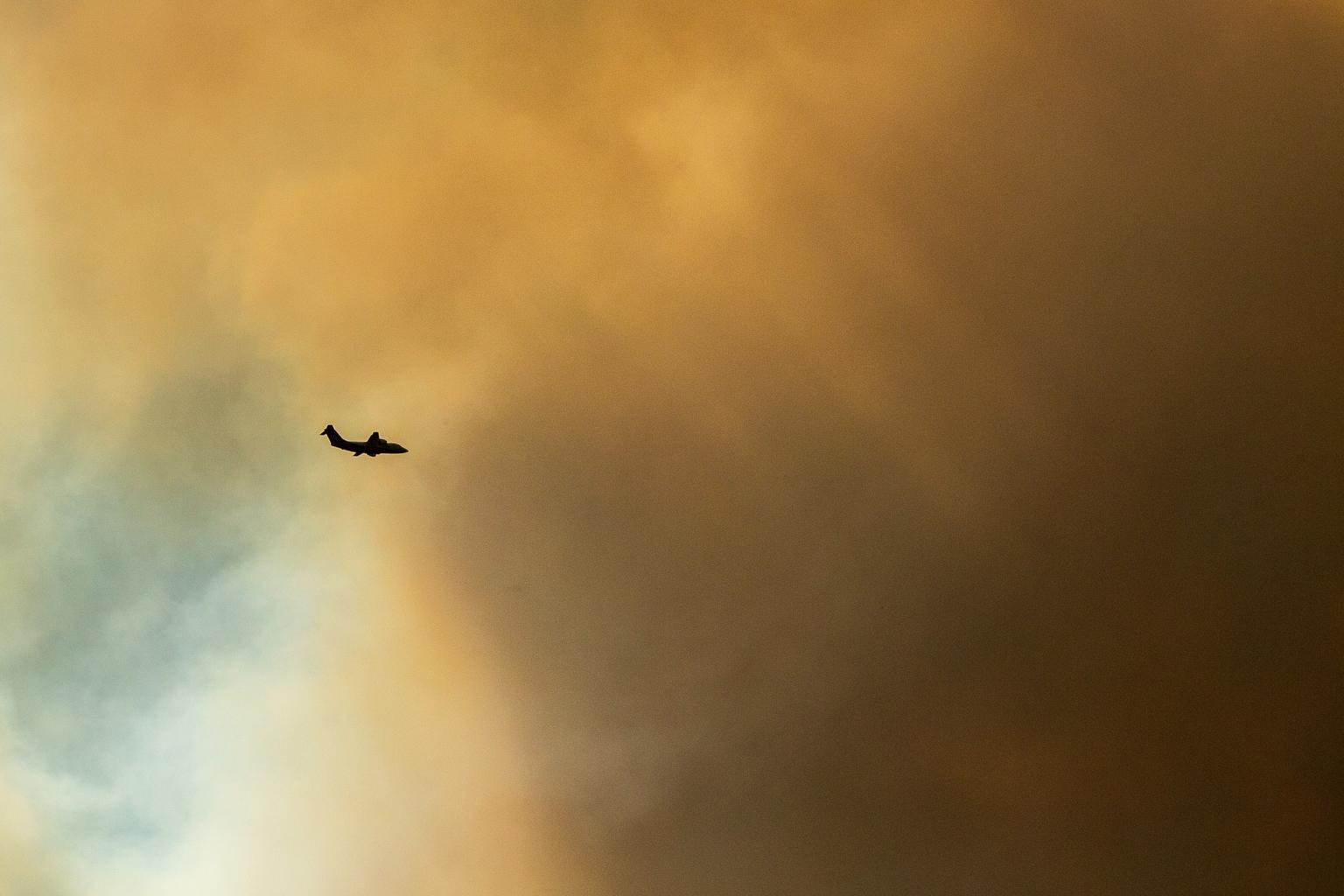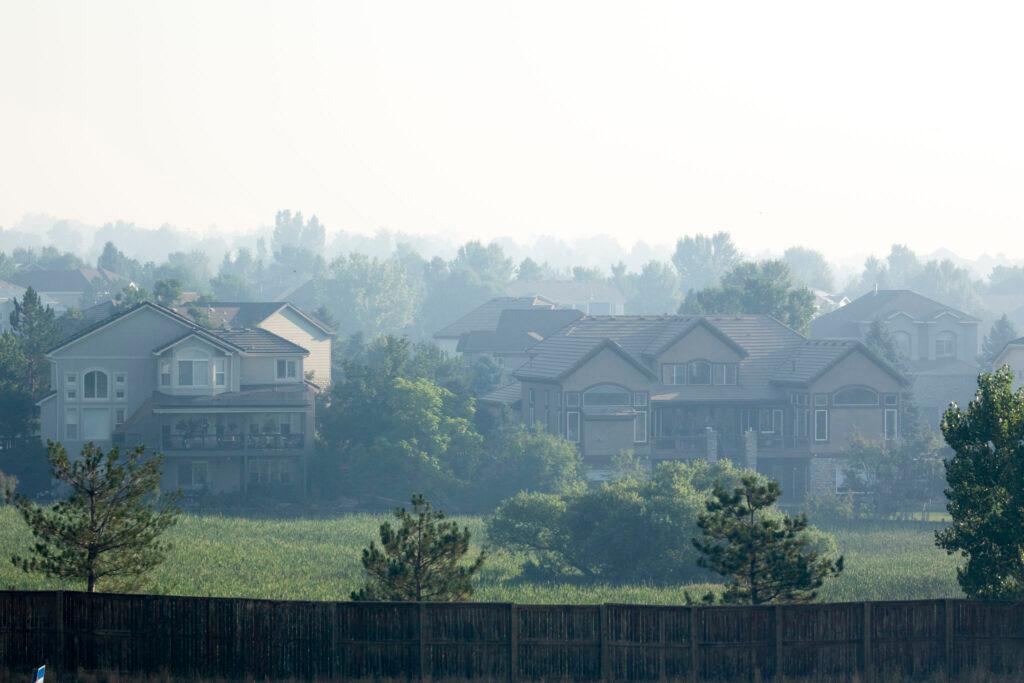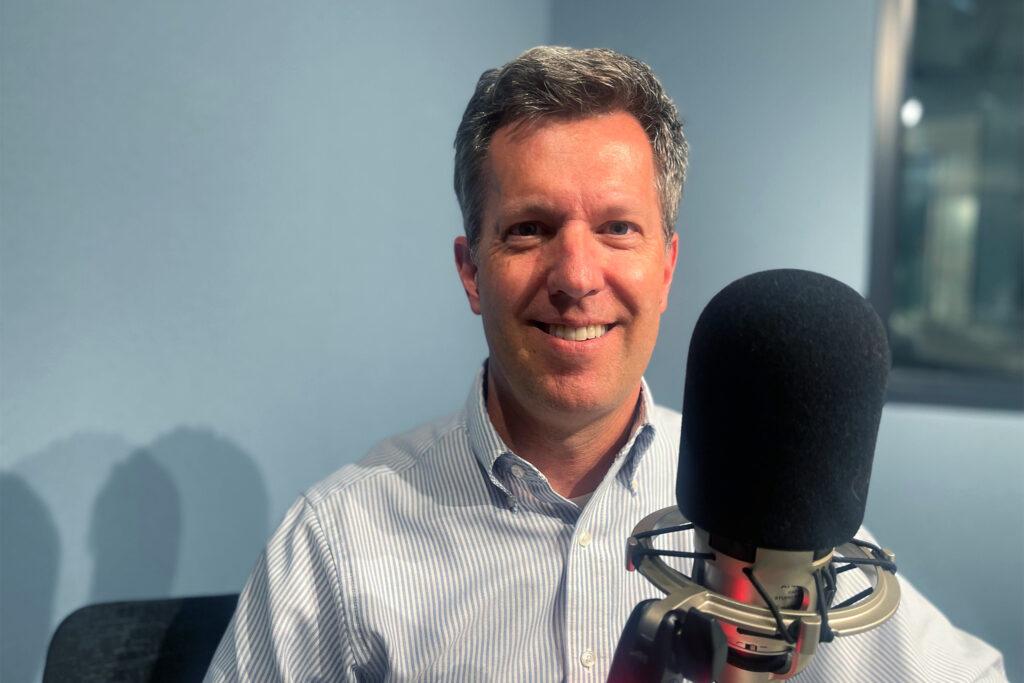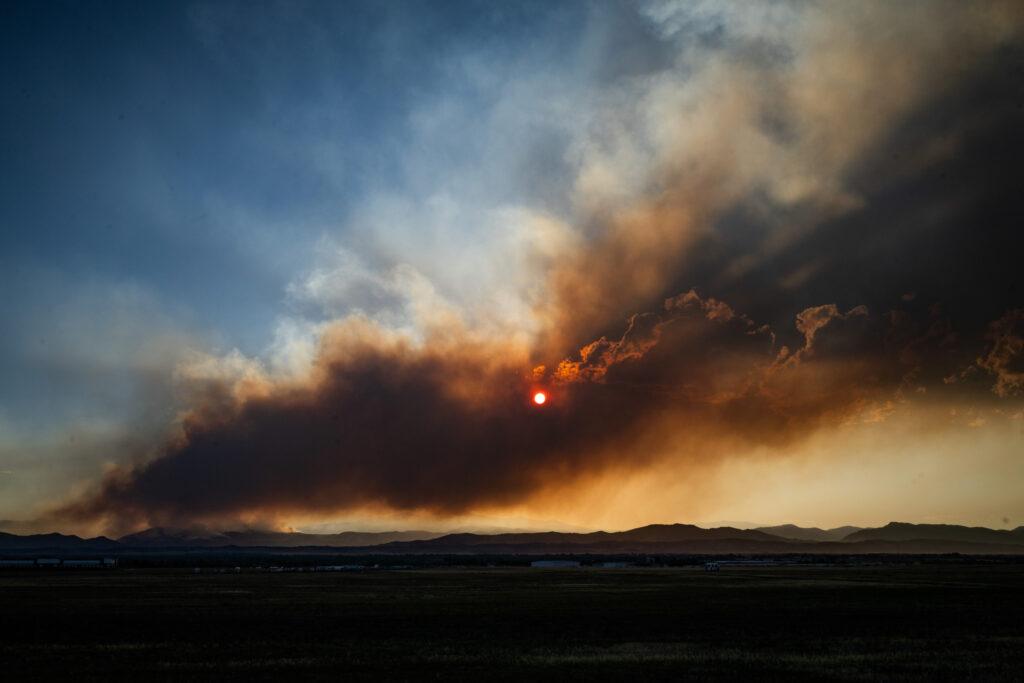
Wildfires may be hardest on the people forced to flee from them or those who have to fight them. But a fire’s effects are far-reaching, especially when it comes to the air we breathe. And as hotter, drier conditions lead to more fires, climate change will have an increasingly harmful effect on everyday health.
Small particulate pollution “gets deep into the lungs, and so it might be obvious that that would irritate asthma or other lung diseases, but what it actually can do is cause inflammation throughout the body,” said Dr. David Beuther, a pulmonologist at National Jewish Health in Denver.
The best advice is to stay indoors, away from smoky air. Dr. Beuther says HEPA filters can help. “It turns out that probably the most important thing is to have a high-efficiency filter on your furnace,” said Dr. Beuther.
If you can’t do that, he says you can also improvise a standalone filter, using an inexpensive box fan.
“And you can buy a few of these HEPA filters at the hardware store and … tape them together in a box and put the fan on top,” said Dr. Beuther. “In other words, you have a fan that's sucking air through those filters and blowing it out the top. It might cost $25 or $50, but if you have absolutely no other way, you can put this in your room and you can filter the air and it still might smell like something's burning, but you can be reassured that at least the health effects from that particle pollution are substantially reduced.”
This interview has been edited for length and clarity.
Ryan Warner: When I stepped out of my house Wednesday in Denver, it smelled like a campfire. And even inside the office, I've been sneezing. My nose has been running. I can imagine I'm not alone with this.
Dr. David Beuther: Oh, absolutely. It's affecting all of us, even those of us that are healthy. That first warning sign of that awful smell from the fires is certainly an indicator that things have made a change for the worse.
Warner: I know that you specialize in folks with asthma, persistent cough, but all of us are impacted.
Dr. Beuther: All of us are impacted, and there are some people that their homes are burning down or people have lost lives in these fires and we want to honor that. But even healthy people who are far away from these fires are, yeah, they're feeling crummy. They're getting headaches or a cough or scratchy throat, itchy eyes. So it really does affect us all.

Warner: I was unsettled this week to learn that wildfire smoke exposure is linked to a greater risk for dementia. These findings were presented Monday at the Alzheimer's Association International Conference. I wonder if results like that surprise you.
Dr. Beuther: This may be less surprising to me than the lay public. If I look more in my realm of lung disease, we know that this small particulate pollution from all the junk that we inhale, and particularly these wildfires, has this really fine particle pollution called PM2.5. It gets deep into the lungs, and so it might be obvious that that would irritate asthma or other lung diseases. But what it actually can do is cause inflammation throughout the body. And so we see on a population basis increased visits to the ER for heart attacks, for example. So those with heart disease can be affected by poor air quality. And so we see systemic inflammation. And so it maybe doesn't surprise me that we see effects on other body systems. And those effects are probably not large because we don't think of our neighbor all of a sudden developing dementia tomorrow because they had one day of bad air quality. But when you look over millions of people or the Denver metro area, it's a lot of people, and that can have a meaningful effect on health outcomes.
Warner: When I hear inflammation, I think that that's the body triggering a response to something that it may believe is attacking it. So these fine particulates come in and the body necessarily sees them as foreign bodies to be inflamed against. In very layman's terms, is that what's going on?
Dr. Beuther: It is part of what's going on in that, to some degree, this is a reaction to injury. The particulates are irritating and in the lungs, the airways might produce more mucus to try to trap the particles and expel them out of the lung. But we also think about the many different components of poor air quality. It's particulate pollution, it's ozone, it's nitrogen oxides, sulfur oxides, volatile organic compounds, carbon monoxide. And some of these things are coming out of the tailpipes of cars and things. And if we think about just ozone for example, it's also a very irritating substance that can cause direct injury and that injury can then generate this immune response.
Warner: Last year, a team at the University of New Mexico found that tiny particles from smoke enter our circulatory systems from the lungs then cross the blood-brain barrier, resulting, they found, in brain inflammation. And that underscores Doctor, I guess, that all of these systems are related.
Dr. Beuther: Absolutely. And these particles get everywhere. And I think we have to balance two things in our hand at one time. This can sound really scary. We've heard about microplastics getting into our food and our bodies and they go everywhere and they're found in our organs. And now we're hearing about small particles. And I think on the positive side, the effects are pretty modest in general, but it does broaden our understanding and hopefully that's going to translate into ways to protect ourselves or better therapeutic approaches to try to mitigate this damage.
Warner: That's a really important line of questioning, I think, especially in light of climate change. We are looking, indeed, at conditions exacerbating wildfires like these. So what is the course forward?
Dr. Beuther: Yeah, it certainly seems like here in Colorado we made some good progress and then we take this big step backwards, and a lot of that's driven by the change in our climate. So we might tighten up our regulations around fossil fuels, and we have a lot more electric cars on the road. And all of these initiatives that the governor's promoted and recently signed into action, will all help drive us forward. But we have to continue to do more and more because the temperatures keep going up. And that does a lot of things. The higher temperatures drive more of this ozone-type pollution. It drives worsening air quality. But of course, as we see, it also increases the risk of bigger, larger, and more frequent fires.
We have to continue to put pressure on ourselves as individuals, as part of a community, as well as our government, to continue to make progress and changes to improve our air quality, whether that be public transportation, trying to avoid driving, not using your lawnmower in the middle of the day, all the ways to regulating our use of fossil fuels and that sort of thing.
Warner: This is fascinating. I almost envision you writing a prescription for climate change action.
Dr. Beuther: It's interesting because as physicians, we're kind of trained to take care of the individual patient and nothing else matters. And we're starting to realize, well, no, you can't prescribe every patient a million-dollar treatment because you'll go broke. And so you have to be a little cost-conscious. This is a similar sort of thing. We have to think a little bit more, what's the prescription for our community? What's the prescription for society, for our environment? It gets to the point of more public health, which we've very much about during the pandemic. And then also organizations like the American Thoracic Society where we're particularly interested in air quality, are starting to really gear up their advocacy for their patients. Because people aren't speaking for my patients on Monday who are telling me, year after year now in Colorado, "I'm spending my summer in the house. It's like the pandemic. I'm stuck inside while the healthy people are outside." What are we going to do about that?

Warner: Let's take this from the population level though, to an individual level. Air purifiers, is that something you recommend? And I ask that knowing that those carry a cost and that this might be an instance where those without means are harder hit.
Dr. Beuther: As is all too often common, those with fewer resources suffer more because they often can't avoid working in an environment that has bad air quality, or moving away when the air quality gets bad. We had somebody developing an app come to us and say, "Oh, we can develop an app that tells you when to get out of town when the air quality is bad." And my comment to them was, "Well, let me introduce you to people that aren't wealthy." And so we have to be mindful, but it turns out that probably the most important thing is to have a high-efficiency filter on your furnace. So if you're in an apartment or a home that has one of those cartridges that filters the air. To get a HEPA filter, you can look at the instructions, they are a little more expensive, but they can filter out this PM2.5, this small particle size.
So if you can stay indoors with windows and doors shut and you can run the air or the air conditioning circulating with one of those high-efficiency filters, you're really doing about as much as we could expect you to do. You don't necessarily have to spend hundreds of dollars on some gadget that you plug into your house. And in fact, some of those work on electrical charge and actually can create ozone within your house, which for some patients actually can harm them. I wouldn't discourage people from using them, but I don't know that we have the evidence that the $600 air purifier, so to speak, is all that much worth it.
What you can do if you don't have much means or any control over your ventilation system is you can get one of those box fans, those big electric fans, that cost you next to nothing to plug into the wall. And you can buy a few of these HEPA filters at the hardware store and you can tape them together in a box and put the fan on top, and you can create your own poor man's air filter. In other words, you have a fan that's sucking air through those filters and blowing it out the top.
So people have been able to create this and it might cost $25 or $50, but if you have absolutely no other way, you can put this in your room and you can filter the air. And it still might smell like something's burning, but you can be reassured that at least the health effects from that particle pollution are substantially reduced.
Warner: What about times of day? So when I think about ozone, for instance, I think of that soup, that chemical soup, cooking throughout the day as the sun has intensified and being worse in those hours when I'm told not to gas up my car, for instance. Is that generally true that late nights and early mornings are a little safer for us?
Dr. Beuther: It's absolutely true, and we see the air quality improve dramatically first thing in the morning and later in the evening. If you're healthy, you could probably get a little short exercise in, early in the morning, and be fine. I think the issue becomes vulnerable patients might even not be able to do that. Not everyone can exercise at those times, but personally, from my perspective, we also want to avoid strenuous exertion in this heat. Let's not forget that we're also getting record heat this week, and the middle of the day is not a great time to exercise in terms of how you feel or even the safety, even if we ignore the air pollution. So I think there are plenty of reasons to avoid the middle of the day, not just the air quality.
Warner: What questions loom still about the health effects of wildfire?
Dr. Beuther: I think we still don't fully know, and we're still learning about all of the ways, and more specifically, how this affects us. So some of the research you mentioned where we're finding particles get into the circulation and they cross the blood-brain barrier. That's just the initial kind of opening of, "Oh, shoot, maybe this affects the central nervous system." And then the next question is how, and then what do we do about it? So I think there's more and more biology, basic science, to try to understand this. And so there's a lot of active research, many institutions, including National Jewish, looking at, well, how actually does this happen? Because we learn more specifically, how does the immune system try to react to that injury?

Warner: Right. Is there something you could do to address that reaction perhaps? That inflammatory response?
Dr. Beuther: Exactly.
Warner: But what an interesting thing to say. Our own human actions are making the climate worse. Let's come up with a drug that neutralizes a pretty natural response to this environmental reality.
Dr. Beuther: Yeah, it seems crazy. We know what we need to do from a population or a community standpoint, so why are we wasting our time on this? But those are difficult problems to solve, and as difficult as it is to understand the human body, we might be closer to figuring out how to block some of the deleterious effects of climate change sooner than fixing the climate.
Even if we had the perfect prescription for the climate, it's going to take years or decades to get that back under control. So we're going to have to deal with this and we can be on more than one track.



